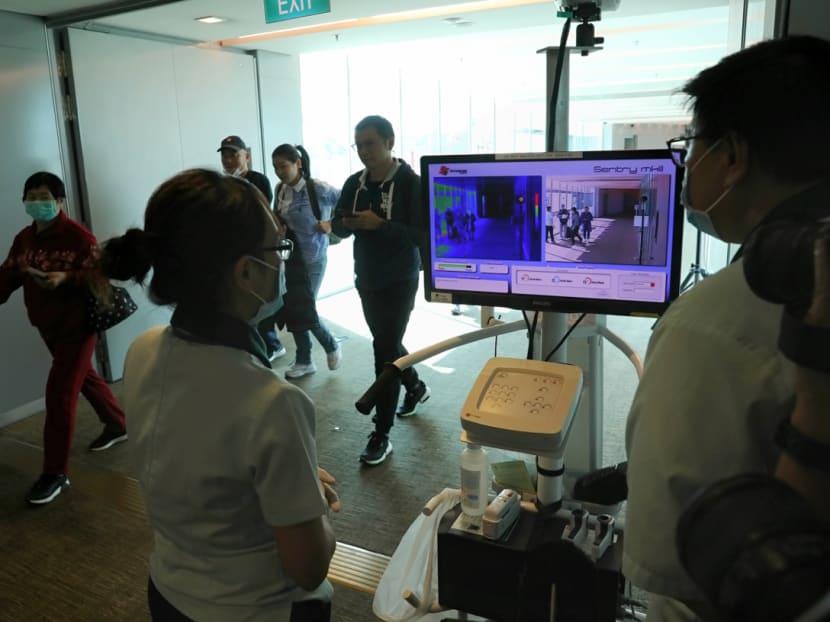All new visitors who have been to China in the last 14 days to be barred from entering, transiting through S'pore
SINGAPORE — In light of the worsening Wuhan coronavirus situation, the authorities are raising travel restrictions from midnight on Saturday (Feb 1), with all new visitors who have been to China in the last 14 days barred from entering or transiting through Singapore.
SINGAPORE — In light of the worsening Wuhan coronavirus situation, the authorities are raising travel restrictions from 11.59pm on Saturday (Feb 1), with all new visitors who have been to China in the last 14 days barred from entering or transiting through Singapore.
With immediate effect, the Immigration and Checkpoints Authority (ICA) will also stop issuing all forms of new visas to those with People’s Republic of China (PRC) passports.
Separately, the Ministry of Manpower (MOM) announced on Friday that with immediate effect, it will reject all new work pass applications for foreign workers from mainland China until further notice. However, renewal applications for existing work pass holders will not be affected.
The Ministry of Health (MOH) said in a press release on Friday that it will also suspend Singapore’s status as a visa-free transit facility for those with PRC passports.
Previously issued short-term and multiple-visit visas for those with PRC passports will also be suspended. During this period of suspension, they will not be allowed entry into Singapore.
Responding to questions from the media on Friday, National Development Minister Lawrence Wong said that the number of travellers from China has already reduced by 80 per cent in the last few days, due in large part to the outbound travel restriction put in place by the Chinese authorities.
ICA commissioner Marvin Sim said that with Singapore’s new travel restrictions in place, visitors who fall into one of the categories under the travel ban will be placed on the next available flight of the same airline they arrived here on back to where they came from.
However, Mr Wong said that the ICA will entertain appeals from PRC passport holders who have not recently travelled to China.
“I think we can take (these cases) as separate from the policy and on an operational level, the ICA will have to deal with these instances,” he said.
When asked whether Chinese nationals who have Singaporean family members will be allowed to enter the country together, Mr Wong said that such a situation is “not so straightforward” and it is ultimately up to the Chinese authorities to decide whether they can leave the country.
“We would be happy for the Singaporean to be returned but whether or not a non-Singaporean can exit and a PRC national can leave, that’s not quite within our jurisdiction,” he said, adding that the Government will work with the Chinese authorities if such circumstances arise.
Separately, MOH also announced that with immediate effect, Singaporeans, permanent residents and long-term-pass holders (including those holding Work Passes and Permits, Student Pass, Dependant Pass and Long-term Visit Pass) can return from China, subject to a leave of absence of 14 days.
MOH said that those who have been put on a leave of absence should stay at home and avoid social contact.
They should avoid crowded places and refrain from attending social or public gatherings. They should monitor their health closely, and seek medical attention immediately if they develop any fever or symptoms of acute respiratory illness such as cough or shortness of breath.
In a press release on Friday, MOM said that employees who are on a leave of absence could work from home.
“Employers and employees have a joint duty to ensure that the employee behaves responsibly during the leave of absence. MOM reserves the right to take action against the employer or employee if they fail to discharge their duty,” the statement said.
Responding to questions from the media on whether the Government will place current Chinese visitors in Singapore under quarantine, Mr Wong said that there are no plans to do so.
“(These visitors) are all on short term visas and they will leave Singapore eventually,” he said.
MOH said this is an expansion of the previous measures already implemented for people who interact closely with vulnerable populations in certain sectors — childcare and education, healthcare and eldercare.
Previously announced quarantine requirements for returning residents and long-term pass holders with travel history to Hubei, or with PRC passports issued in Hubei, remain in effect.
The new measures come after the United Nations health agency on Thursday declared an international emergency over the deadly Wuhan coronavirus.
However, during the press conference on Friday, Mr Wong said the Government did not make the decision to ramp up existing measures based on the WHO’s announcement, but based on advice from experts and from monitoring the evolving situation in China.
“As I mentioned before, we have a series of drawer plans and we look at each action based on the latest information and expert advice,” he said.
“Of course to some extent we do get more information from the WHO announcements, but it is also an evolving situation and day by day we have been updating the assessment of the latest situation in China, beyond Hubei. That is the main reason why we are putting in place more travel restrictions today.”
Sixteen people have tested positive for the virus in Singapore, including a 47-year-old Singaporean woman who evacuated from Wuhan on Thursday. The rest of the infected patients are Chinese nationals from Wuhan.










